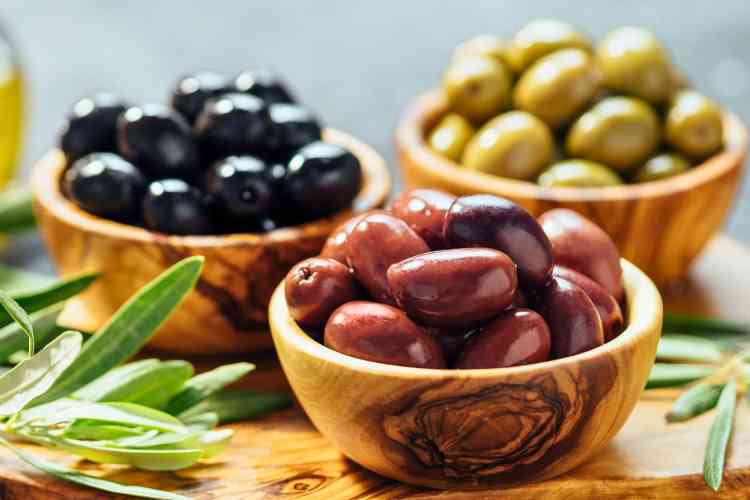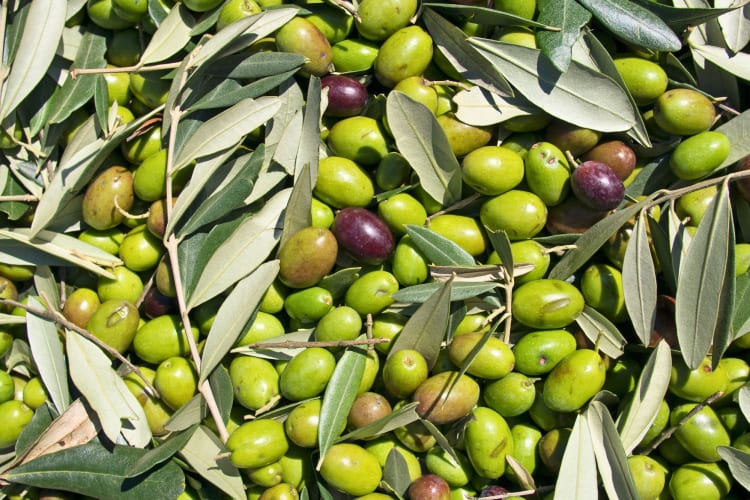Are Olives Healthy for You?

If you’ve ever found yourself snacking on olives straight from the jar, you might have asked yourself, “Are olives healthy?” What’s more, as the soaring popularity of the Mediterranean diet for promoting health has boosted the profile of olives, it might start feeling especially pertinent to know whether olives are healthy. If you’re a fan, you’ll be glad to know that the answer is yes!
Though you’ll want to be careful with portions due to their high sodium content, olives are a great addition to a balanced diet. So, are olives healthy? Absolutely — read on to find out why you should reach for that jar of olives next time you need a snack.
Jump to Section
Are Olives Healthy for You?
There is a reason that olives play such an important role in the heart-healthy Mediterranean diet. In addition to whole grains, fresh produce, legumes, fish and lean meats, olive oil is a critical component of the Mediterranean diet. So, we know that they’re good for you, whether you’re cooking with olive oil or snacking on pitted olives. But why are olives healthy?
Firstly, olives are high in vitamin E and other antioxidants, which protect against inflammation and all of the myriad health concerns that it causes. No one who’s noticed the metallic taste of olives will be surprised that they’re high in iron and copper. Finally, they are also a great source of fiber and promote healthy digestion.
Why else are olives healthy? Heart health is a key benefit. Olives contain monounsaturated fats like oleic acid, which are linked to a reduced risk of heart disease, lower cholesterol and healthier blood pressure.
Thanks to the antioxidants they contain, olives help to protect us from inflammation-related ailments and their high calcium content reduces the risk of osteoporosis. Even more interestingly, recent research has linked eating olives regularly to a lower risk of developing cancer, thanks to several of the plant compounds they contain.
But be careful…sodium is the biggest nutritional drawback with olives. Olives are healthy, but since they’re kept in a briny liquid, they have some serious salt. If you have high blood pressure or are trying to prevent it, moderate your portions to avoid too much sodium.
So, to recap: are olives healthy? You bet. And even if they’re not to your taste, you can get many of these health benefits from olive oil, which is easy to use and doesn’t have the polarizing briny taste of a whole olive. It’s important to keep in mind that lower-grade olive oils may contain fewer nutrients and antioxidants due to processing and that moderation is key due to how calorie-dense oil is.
However, you may be wondering about different varieties of olives. Are olives healthy in all forms or are some olives healthier than others? While the answer is yes, olives are healthy in any color, there are slight nutritional differences between varieties that you might want to take note of.

Are Green Olives Healthy For You?
The difference between green and black olives isn’t as stark as you might think. They’re the same fruit — did you know the olive is a fruit, by the way, and sometimes even considered among the healthiest fruits?
Green olives are picked before they’re ripe, while black olives are ripe when they’re picked. Ask, “Are olives healthy?” and the answer will be yes no matter what variety you’re talking about. Green and black olives are fairly similar nutritionally, but there are slight differences you may want to note.
Are green olives healthy for you? Absolutely, but green olives tend to contain more sodium, calories and fat than black olives. These differences aren’t huge, and green olives are healthy either way, but you may want to note that if fat or sodium is something you’re watching. It also means that it’s more important to look for low-sodium brands of green olives for optimal health. For the healthiest snack, also make sure to look for olives that use minimal preservatives.
Not only are green olives healthy, they actually contain more vitamin E than their black counterparts. More than just looking snazzier on the rim of a martini than black olives, green olives pack in more of the benefits to your vision, skin and hair that come with a high concentration of vitamin E. So, if vitamin E is lacking in your diet, go for green.

Are Black Olives Healthy for You?
All olives are healthy, but if you’re anemic or struggle to get enough iron in your diet, you might want to eat black olives more often. That’s because, compared to green olives, black olives are richer in iron, as well as lower in fat and sodium.
You still might want to look for low-sodium and all-natural brands to get the best bang for your nutritional buck, but if you go for black olives you’ll enjoy the benefits of an iron-rich snack. Black olives are healthy for you both because of their high iron content and their lower sodium and fat content when compared to green olives.

Are Kalamata Olives Healthy For You?
This is a bit of a trick question, because Kalamata olives are actually a sub-variety of black olives. What makes Kalamata olives special isn’t their nutritional profile or even flavor, but where they’re grown: true Kalamata olives have to be grown in one of two regions in Greece. While they can be grown in other regions, they have to grow in Greece to get the official Kalamata varietal designation.
Outside of that geographic distinction, Kalamata olives are better known for their unique and intense briny flavor. This sets them apart from other black olive varieties.
Nutritionally, however, they are pretty similar to that of other black olives. They’re low in fat and calories, rich in iron and antioxidants, a great source of healthy fats and strongly linked to a lower risk of several diseases. Though they’re not too different from black olives, that should tell you that Kalamata olives are healthy.

How Healthy Are Olives for You?
We’ve answered the question, “Are olives healthy?” in detail, but how do the numbers stack up? Here is the nutritional profile of black olives.
One 100g serving of canned black olives provides:
- 116 calories
- 0.84 g protein
- 10.9 g fat (unsaturated fat: 9.3g)
- 6.04 g carbohydrate
- 1.6 g fiber
- 88 mg calcium
- 6.28 mg iron
- 735 mg sodium
- 1.65 mg vitamin E
Pretty great, right? While this list makes it easy to see why black olives are healthy, it’s also important to note that the sodium content is a little high. Since a diet high in sodium can lead to high blood pressure and heart disease, you might want to focus on low-sodium varieties of black olives when you’re searching at the supermarket.
One 100g serving of canned green olives provides:
- 145 calories
- 1.03 g protein
- 15.32 g fat (unsaturated fat: 13.3g)
- 3.84 g carbohydrate
- 3.3 g fiber
- 52 mg calcium
- 0.49 mg iron
- 1,556 mg sodium
- 3.81 mg vitamin E
Notice that green olives have over double the sodium and a slightly higher fat content of an equivalent serving of black olives! So, are olives healthy no matter what color you choose? Sure thing, but if you’re watching your sodium content, be careful to limit yourself to a small portion of green olives.
Lastly, you may be curious about olive oil, since it’s such a convenient way to get the benefits of olives in your diet — especially if you don’t love their flavor on its own. Surprisingly, the nutritional profile of 1 tbsp (15g) olive oil is pretty similar to that of a serving (100g) of whole olives, with 118 calories, 13.5 grams of fat (11g unsaturated) and 1.94 mg of vitamin E. What’s more, a high-grade olive oil will have 0 mg of sodium.

What Are the Health Benefits of Olives?
So, why are olives healthy? There are several reasons:
Fighting Inflammation
Olives help fight inflammation as they contain antioxidants. Since inflammation is a key culprit in many illnesses, from high blood pressure to Crohn’s disease, this health benefit means that olives are healthy for maintaining overall well-being.

A Heart-Healthy Snack
The Mediterranean diet was shown in a study by NEJM to reduce the risk of getting heart disease by 28%, and that’s in no small part thanks to the fact that it uses so much olive oil. The helpful inflammation-fighting antioxidants in olives are one reason for this, but another reason that olives are healthy for your heart is that they’re high in monounsaturated fats and plant compounds that help you keep your cholesterol and blood pressure down.
Combined with their antioxidant-rich nutritional profile, olives make healthy snacks that help to prevent heart disease. Even better? That Mediterranean diet study shows us that olive oil is just as good a source of heart-healthy compounds as whole olives are.

Reduced Risk of Cancer
While more research is needed to strongly link the antioxidants in olives to reduced cancer risk, many people cite this as one of the many reasons olives are healthy. Preliminary research has indicated that people who eat olives regularly are at a lower risk of cancer, so you may want to take that into consideration when meal-planning.

Keep Your Vision Sharp
You may not be able to turn in your reading glasses just yet, but vitamin E promotes eye health. Since olives are rich in vitamin E, they might help to protect your eyesight, as well as your skin, hair and cognition.

Beat Bone Loss
As we age, bone density becomes an increasingly pressing health concern, as bone loss can lead to osteoporosis or a greater risk of falls and injuries in the elderly. To protect yourself against these risks, it’s important to eat a diet rich in calcium.
The average serving, around six olives, provides 12% of the recommended daily calcium intake for adults. Besides promoting healthy aging, olives are healthy for people who have sensitivities to dairy and can’t get their calcium from typical sources like cheese, yogurt and milk.

So, after all of this, are olives healthy? Yes, they are. Whether green or black, olives boast many health benefits that make them a worthy addition to your everyday diet. Whether you’re cooking with olive oil or eating whole olives as a snack, your health will benefit. So, why not make it a goal to find more ways to enjoy olives?
For even more ways to explore your favorite foods, check out other experiences happening on Cozymeal.



FOOD FOR THOUGHT?
Join the conversation.